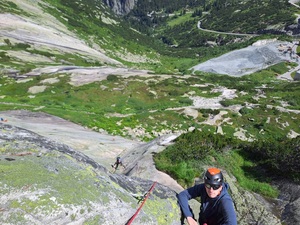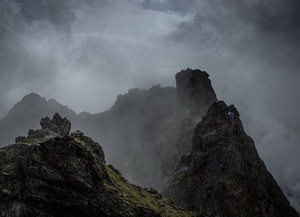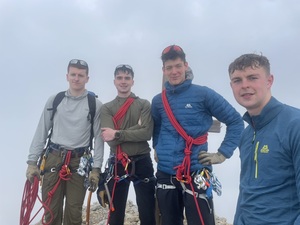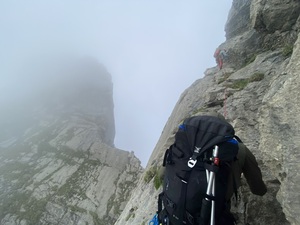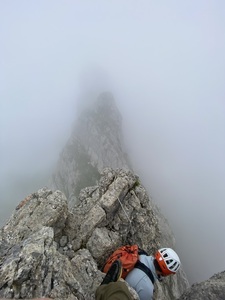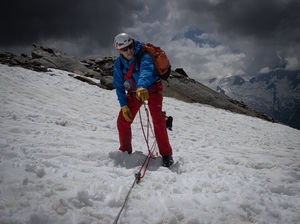Ex CADET GLACIAL EMU was an East Midlands UOTC Adventurous Training expedition held in the Bernese Oberland region of Switzerland from 29th June to 12th July 2025. The exercise involved 12 participants—4 instructors and 8 Officer Cadets—and aimed to introduce the Officer Cadets to Adventurous Training while completing the Alpine Mountain Foundation (AMF) course.
The expedition began with training in the fundamentals of mountaineering. At Blindspot Crag, OCdts learned essential ropework including belaying, anchor creation, and traditional gear placement. In the afternoon, they progressed to glacier training in Saas Grund, focusing on ice axe arrest, crampon techniques, and crevasse rescue. For many, this was their first time at such high altitude (3142m), providing a valuable acclimatisation period.
The following day, the group took a cable car to Gemmipass, followed by a hike to the Lammeren Hut. There, they continued to develop their climbing skills through seconding, leading, abseiling, and scrambling. The high-altitude environment, varied rock types, and sweeping views—including overhead flypasts by fighter jets—offered a memorable and immersive introduction to alpine climbing.
Day 3 saw a return to glacial training, this time on the Wildstrubel Glacier. OCdts practiced placing ice screws and building anchors, applying newly gained techniques in a more exposed alpine setting. This day marked their first real experience of glacial travel across snow-covered terrain, blending technical development with stunning scenery.
Day 4 involved a journey to the Lobhorn Hut (1955m) via Sulwald. The following day, the group undertook the Lobhorn Traverse, a physically and mentally demanding alpine route requiring constant teamwork and vigilance. The route featured climbing, abseiling, and short-roping across exposed terrain. OCdts took turns climbing and belaying, and the sense of challenge and accomplishment made this a highlight of the expedition for many.
Due to deteriorating weather, the original plan had to be adjusted. The group instead moved to the Sustlihütte. On the way, participants enjoyed a refreshing swim in the Brienzersee, complete with floating trampolines and diving boards, a welcome break after the lack of showers in huts!
At the Sustlihütte, one group ventured early onto the Stossenfirn Glacier, facing harsher conditions that tested their resilience and technical ability. Another group tackled the Kanzelgrat ridge, followed by single-pitch climbing sessions that included both sport and traditional lead climbs. Over the following days, additional climbing was completed in the valley.
The expedition required extensive preparation. Two OCdts took a leading role in organising logistics, safety protocols, and the training itinerary—an invaluable opportunity to develop planning and leadership skills. Their efforts helped ensure a tailored and effective training programme. The group also benefitted greatly from the support of the Ulysses Trust, whose funding enabled many to participate despite the expedition taking place during the university break, when financial constraints often force students to return home to work.
Ex CADET GLACIAL EMU was a resounding success. Every participant completed the Alpine Mountain Foundation course and significantly enhanced their mountaineering abilities. One participant reflected:
“I really enjoyed this expedition and am so grateful I had the opportunity to take part. I was able to broaden my climbing and mountaineering skills and learnt how to be safe on challenging terrain. Highlights of the expedition were climbing Wildstrubel, where we put into practice our newly learnt glacial skills, and climbing Lobhorn, which had some challenging sections. This expedition has provided me with new skills and the confidence to carry them out, and I loved the variation in challenges presented. I would not have been able to have these experiences without this expedition running, and I am very thankful to everyone that made it happen.”
The exposure to alpine environments, combined with the physical and technical demands of mountaineering, served to enhance each cadet’s personal resilience, teamwork, and leadership. The experience has prepared them for future challenges—both in military and personal pursuits—and would not have been possible without the generous support of the Ulysses Trust.

